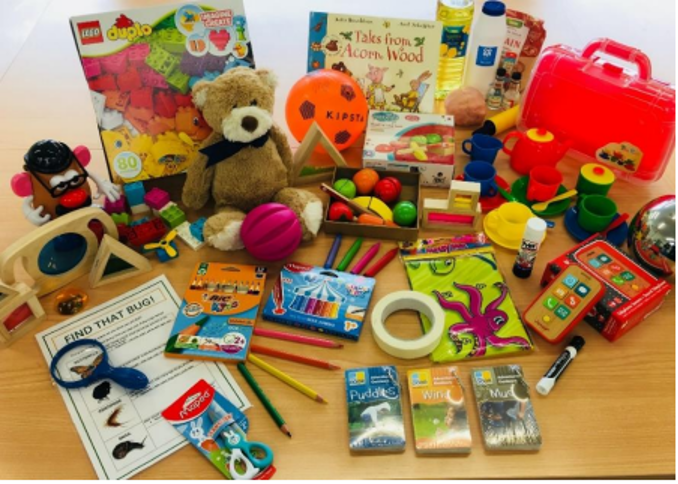One of the main challenges with the box was its physical size and weight, which meant that it could not be handed over to the parents to take away on the last day of the Elklan course. Instead, a CCC had to undertake a visit to each home to drop them off in the subsequent weeks and they were difficult to load/unload from cars. This made it an additional time burden to the CCCs.
Another challenge we faced was deciding which items to keep or replace, after each round of training, as the feedback from parents was so varied. Some parents loved the items that other parents didn’t find as beneficial, and some parents felt there was too much included and would have preferred a more condensed version. We knew that children learn in different ways and have different interests, so it made sense that the resources that engaged one child, would not necessarily engage another.
Direct comments to UEA researchers from parents exposed mixed views too. Some indicated that they did not need or did not have space for such a large quantity of items. One parent explained that she would keep one or two items and donate the rest to her pre-school who had been such valuable support to her family.
At a cost of just under £150 per box, it is unlikely that such an initiative would be sustainable longer term. The UEA researchers expressed that alternative approaches could have been explored and these may have distributed the benefits even more widely. For example, providing a smaller gift, of maybe one or two items from the box, chosen by the parent and child.
One idea the CCC team came up with, following completion of a couple of cycles of the HLP, was the creation of a ‘Practitioners Box’ that could be given to community leaders who undertook cascade training, with a view to maintaining a commitment to the continued and extended provision of SLC activities throughout our target wards.
The plan for the box was to include a collection of resources designed to enable a setting or practitioner to offer superior quality play experiences to a larger number of families. This seemed a promising investment for the future and an idea that could be tailored to suit the needs of the individual setting or practitioner.
Whilst the CCC team unfortunately did not have the time or capacity to action this idea within the lifecycle of the project, Norfolk County Council are currently working on a similar strand of work that will eventually see a county-wide roll out of play supporting resources for settings and families.

